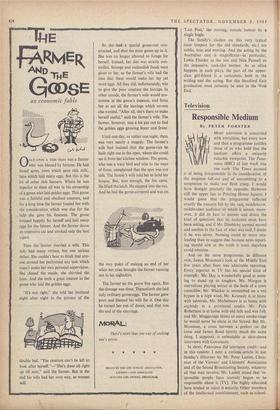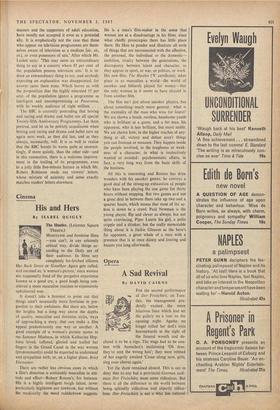Television
Responsible Medium
By PETER FORSTER MOST television is concerned with trivialities, but every now and then a programme justifies those of us who hold that the medium offers a uniquely valuable viewpoint. The Pano- rama (BBC) of last week was one such. The Times accused it of being irresponsible in its consideration of the megaton fall-out and of succumbing to a temptation to make our flesh creep. I would have thought precisely the opposite. However stiff the upper lips in Printing House Square, I would guess that the programme reflected exactly the concern felt by the vast, middlebrow, middle-class audience at which it aimed; more- over, it did its best to answer and direct the kind of questions that its audience must have been asking, and if Mr. Dimbleby seemed moved and sombre in the face of what was said, I doubt if he was alone. Nothing could be more mis- leading than to suggest that because news report- ing should aim at the truth it must therefore avoid emotion.
And on the same programme, in different vein, James Mossman's look at the Middle East five years after Suez was admirable reporting. Every reporter in TV has his special kind of triumph: Mr. Day is wonderfully good at seem- ing to stand up to toughies, Mr. Morgan is marvellous playing terrier at the heels of a town councillor, Mr. Whicker is unmatched on a wet bypass in a high wind, Mr. Kennedy is at home with admirals, Mr. Michelmore is at home with anybody in a provincial studio, Mr. Fyfe Robertson is at home with old folk and wee folk and Mr. Muggeridge blows so many smoke-rings he would never be alone in the Strand. But Mr. Mossman, a cross between a prefect on the loose and James Bond (pretty much the same thing, I suppose), is unbeatable at shirt-sleeve interviews with Governors.
In short, Panorama did television credit—and in this context 1 note a curious article in last Sunday's Observer by Mr. Peter Laslett, Chair- man of the Viewers' and Listeners' Association and of the Sound Broadcasting Society, whatever all that may involve. Mr. Laslett stated that 're- sponsible people have scarcely begun to be responsible about it [TV]. The highly educated have tended to reject it entirely. Other members of the intellectual establishment, such as school- masters and the supporters of adult education, have mostly not accepted it even as a potential ally. It is emphatically not the case that those who appear on television programmes are them- selves aware of television as a medium [sic, sic, sic], or even possessors of sets.' After which Mr. Laslett says: 'This may seem an extraordinary thing to say in a country where 85 per cent. of the population possess television sets.' It is in- deed an extraordinary thing to say, and anybody expecting an explanation was disappointed, for answer came there none. Which leaves us with the proposition that the highly educated 15 per cent. of the population ignore a programme as intelligent and uncompromising as Panorama, with its weekly audience of eight million. . . .
The BBC is currently pretending that boxing and racing and drama and ballet are all special Twenty-fifth Anniversary Programmes. Let them pretend, and let us be politely acquiescent when boxing and racing and drama and ballet turn up again next week, as they did last, and as they always, necessarily, will. It is as well to realise that the BBC boosts its wares quite as unremit- tingly, if more quietly, than the other side—and in this connection, there is a welcome improve- ment in the trailing of its programmes, even to a jolly little five-minute feature in which Mr. Robert Robinson reads out viewers' letters, whose mixture of asininity and sense exactly matches readers' letters elsewhere.















































 Previous page
Previous page